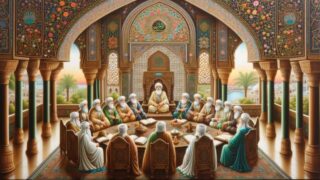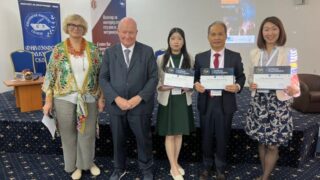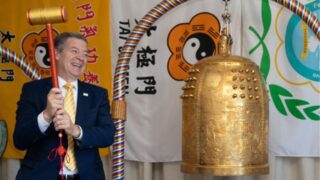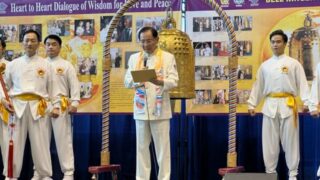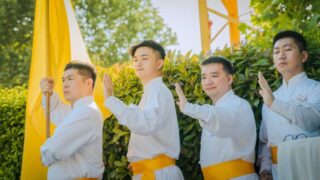The right to non-discrimination and freedom of religion or belief may conflict. International case law has dictated some rules to harmonize them.
by PierLuigi Zoccatelli*
*A paper presented at the webinar “Tai Ji Men: 25 Years of Discrimination,” co-organized by CESNUR and Human Rights Without Frontiers on March 1, 2022, United Nations Zero Discrimination Day.


Not to be discriminated is a human right. There are several different human rights, however, and there may be conflicts between them. It is possible that some of the NGOs that originally proposed the institution of the United Nations Zero Discrimination Day had a somewhat negative view of religion, and saw it more often as a problem than as a resource.
At first sight, there are discriminations promoted by religions. Feminists complain that women are discriminated in the Roman Catholic and Eastern Orthodox churches, as well as in the Church of Jesus Christ of Latter-day Saints, popularly known as the Mormon Church. In all these churches, women are excluded from the priesthood. Less talked about is that there are discriminations affecting men too. As a man, I cannot become a Catholic or Eastern Orthodox or Buddhist nun, although I can become a monk. This was not a problem until a few years ago, but today we no longer know.
There are also what look like discriminations against those who are not members of a certain religion. In the United States, where there are many different religions, flyers in the Catholic churches tell non-Catholics that they are welcome to attend the Mass but should not take communion. If you are not a Muslim, you cannot enter the most holy places of Islam in Saudi Arabia. And so on.
And of course today some claim that churches that refuse to perform same-sex marriages are discriminating against homosexuals. In the United States, the Metropolitan Community Church, a Christian denomination created to cater to homosexuals, has been in turn accused of discriminating against those who are not homosexual.
Perhaps the “Zero Discrimination Day” should have been named the “Zero Unjust Discrimination Day,” although I understand this would have somewhat diluted the effectiveness of the slogan.
Courts of law, both domestic and international such as the European Court of Human Rights, have established two key principles about the conflicts, which exist and are unavoidable, between the right to non-discrimination and the right to freedom of religion or belief (FORB).


The first principle is that religion and spiritual communities have the right to self-organize themselves as they deem fit. While in most circumstances a commercial corporation cannot discriminate by excluding women, or homosexuals, or persons of a different religion than the owner, from certain positions or services, a religious or spiritual organization, within reasonable but broad limits, can. This is part of its FORB. The freedom of certain members not to be discriminated is guaranteed by the fact that they can leave their religious organization and establish another one.
Secular courts of law cannot compel the Catholic Church to have women priests, but the human rights of Catholic women are guaranteed by the fact that they are free to leave the Catholic Church and establish new denominations where women can be priests, and some indeed did. This principle comes under assault periodically, but courts have generally affirmed it. In a recent and very important decision, the Spanish Supreme Court decided that a Catholic lay organization may restrict its membership to men only. Women, the Court said, remain free to establish rival organizations where this restriction would not apply.
The second principle is that, while religious and spiritual groups can include in their practices certain discriminations, based on their freedom to self-organize that is an integral part of their FORB, the states, when dealing with religious organizations, cannot discriminate against some and promote others. It may seem a complicate mechanism, but it is the only one protecting FORB effectively.
These principles are important for the Tai Ji Men case. Tai Ji Men is free to self-organize itself as it deems fit. How, for example, gifts are given from disciples (dizi) to master (shifu) in the red envelopes is part of a spiritual practice and something the authorities should not interfere with. They should not interfere in general on how Tai Ji Men organize the relationship between dizi and shifu either. Conversely, the government is not authorized to discriminate against Tai Ji Men by treating its leader and members differently and with more hostility than it does with other religious or spiritual organizations.


In 1996, not all spiritual organizations in Taiwan were investigated and raided, only those accused of not having supported the presidential candidate of the ruling party. This was discrimination. In Taiwan there are many organizations teaching martial arts, qigong, and self-cultivation, where masters receive gifts in red envelopes. It is generally agreed that these gifts are not taxable. Only in the case of Tai Ji Men was the content of the red envelopes falsely declared a tuition fee and taxed. This was discrimination, again, and the examples can continue.
In conclusion, we should at the same time defend the rights of Tai Ji Men dizi to decide on their own organization without governmental interference, and their right not to be discriminated by the government and to see their human rights fully recognized, including in the tax field.
This corresponds to the real meaning of a Zero (Unjust) Discrimination program.




